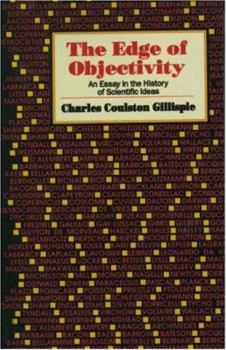Edge of Objectivity: An Essay in the History of Scientific Ideas
Select Format
Select Condition 
Book Overview
From Galileo's analysis of motion to the theories of evolution and relativity, Charles Gillispie takes us on a masterly tour of the world of scientific ideas. The history of modern science is portrayed here as the development of objectivity through the study of nature. In the mid-1950s, a young professor at Princeton named Charles Gillispie began teaching Humanities 304, one of the first undergraduate courses offered anywhere in the world on the history of science. From start to finish--Galileo to Einstein--Gillispie introduced the students to the key ideas and individuals in science. The Edge of Objectivity arose out of this course. It must have been a lively class. The Edge of Objectivity is pointed, opinionated, and selective. Even at six hundred pages, the book is, as the title suggests, an essay. Gillispie is unafraid to rate Mendel higher than Darwin, Maxwell above Faraday. Full of wry turns of phrase, the book effectively captures people and places. And throughout the book, Gillispie pushes an argument. He views science as the progressive development of more objective, detached, mathematical ways of viewing the world, and he orchestrates his characters and ideas around this theme. In the forty-five years since the publication of The Edge of Objectivity , historians of science have established a full-fledged discipline. They have focused increasingly on the social context of science rather than its internal dynamics, and they have frequently viewed science more as a threatening instance of power than as an accumulation of knowledge. Nevertheless, Gillispie's book remains a sophisticated, fast-moving, idiosyncratic account of the development of scientific ideas over four hundred years, by one of the founding intellects in the history of science.
Format:Paperback
Language:English
ISBN:0691023506
ISBN13:9780691023502
Release Date:November 1966
Publisher:Princeton University Press
Length:576 Pages
Weight:1.26 lbs.
Dimensions:1.6" x 5.0" x 8.0"
Customer Reviews
1 rating
An History of Scientific Thought Essay but without Maps, Photos or Plates!
Published by Thriftbooks.com User , 19 years ago
"Stimulating for someone just beginning to take an interest in the history of scientific thought, and sufficiently scholarly in its material and conclusions to be worth reading by the specialist, too." R. Harr, J. Royal Institute of Chemistry Historiography and science: Until W.W.II, analytical and deductive history of science was the province of philosophers or historians of ancient scientistic writing, 'in order to occupy their retirement' C. Gillispie comments sarcastically. His generation, and Thomas Kuhn, is declared by him to have founded the history of science as a professional field of scholarship. Dazzled by atomic bomb, radar, sonar, science students in the forties, developed a strong interest in history of scientific ideas. Since science must have had an evolution history like art, philosophy, or literature, the study of which could lead to a better analysis of its development and importance in the progress of global civilization. A history of science: In his essay, C. Gillispie portrayed 'The history of modern science' as a logical development of objectivity, through the study of natural phenomena. Gillispie takes us on a masterly tour of the world of scientific ideas, from Galileo's analysis of motion to Twentieth century theories of evolution and relativity. Half a century since its publication, The Edge of Objectivity, initiated what is established now as a full-fledged discipline, although the focus has gradually shifted to social influence of science rather than the dynamics of its progress. Science is more frequently viewed, as a challenging show of power than an integration of knowledge. Gillispie's Objectivity: In the early 1950s, Charles Gillispie, a new lecturer at Princeton started teaching one of the first undergraduate courses offered on the history of science, and in Humanities in the western universities. Gillispie introduced his students to the key ideas and individuals in science from Galileo to Einstein in an 'opinionated, and selective' way. Gillispie's fundamental ideas remain as an analytical account of the sophisticated development of scientific ideas over the last four centuries, by one of the founders of modern study trends of the history of science. Gillispie defends a hardly debated concept of science as the progressive development of a more objective, detached, mathematical ways of viewing and presenting the world. Gillispie managed to effectively capture ideas, history and places, and describes his characters and their ideas around this core. A strong and independent mind, he has evaluated Mendel as superior to Darwin, and rates J. C. Maxwell higher than Faraday, to his evaluation many contemporary scholars agree. An Essay's Reviews: In spite of the great reviews this book rightly deserved, then, I regret the outstanding author was too honest to stick to his description of his genuinely titled book, as 'An Essay,' with less than a dozen sketchy illustrations, reminded me with text books mathema






